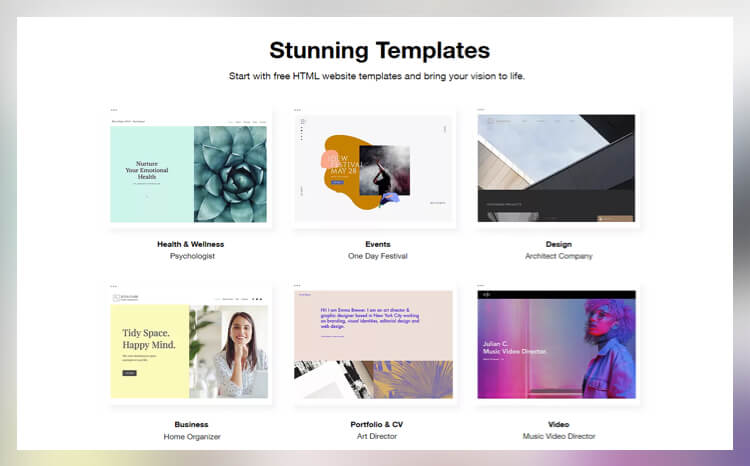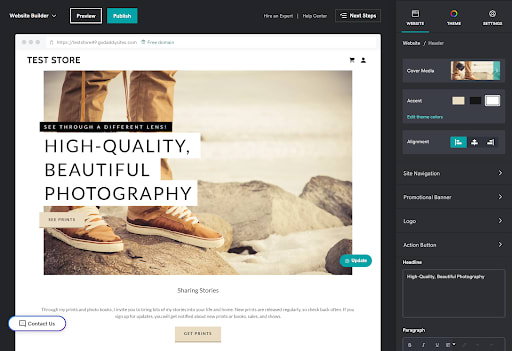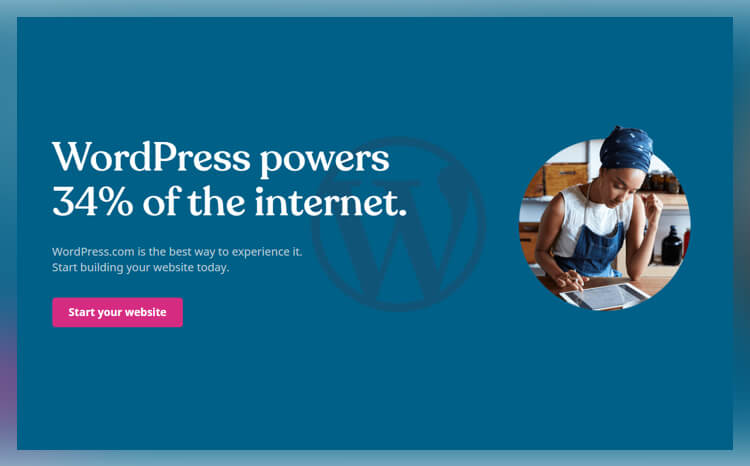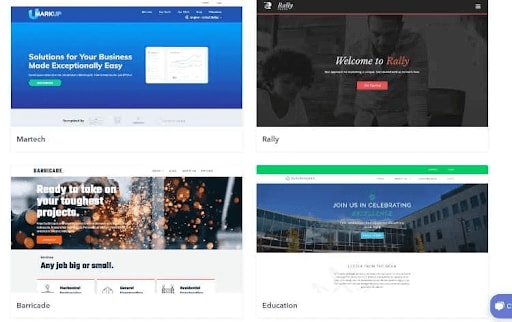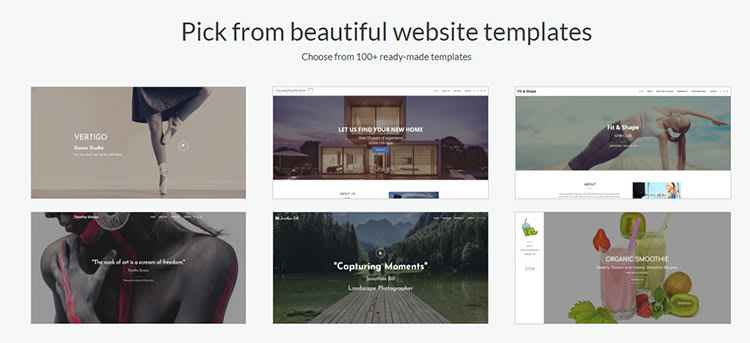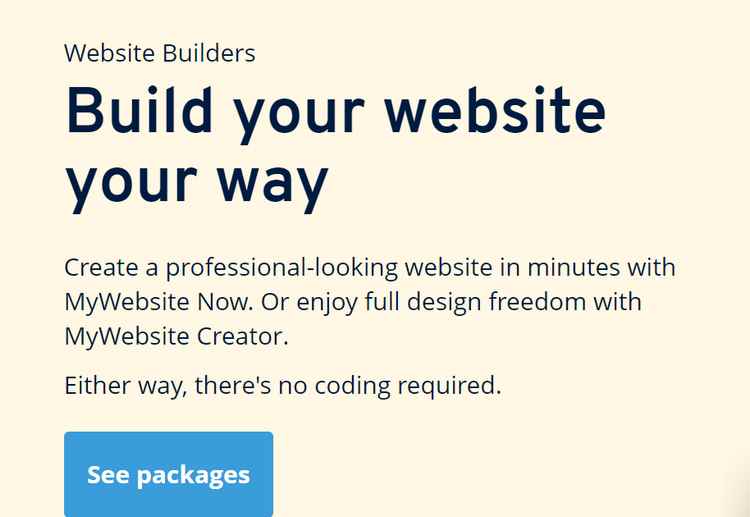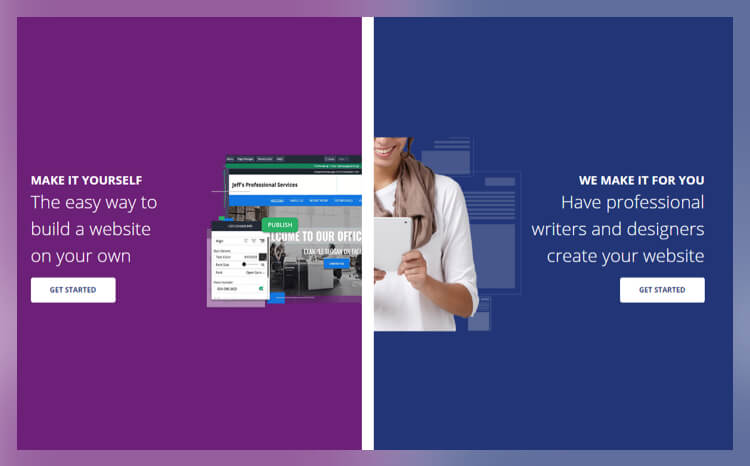What is a Website Builder?
A website builder is a user-friendly platform that lets you create and launch a website in no time, even if you're a beginner with no coding or tech skills. Most website builders feature an intuitive drag-and-drop editor, a selection of pre-designed templates that you can customize, an e-commerce suite, and SEO tools.
How Do Website Builders Work?
Website builders come with built-in editors that translate your design into code. These editors enable you to create your site, control how it looks, add different elements (photos, content, contact forms, and more), and create new pages.
Most website builders have extensive template libraries. From here, you can choose a design that best fits your brand image and vision. Then, you can customize it and add images and content.
The Advantages of Website Builders
Website builders have tons of advantages for business owners who want to launch an online presence quickly without spending hundreds or even thousands of dollars.
- Ease of use: Website builders are pretty intuitive, and you don’t need any coding or special tech skills to use most of them.
- Customization options: Site-building platforms usually have a wide selection of professionally designed templates you can customize to build a website that fits your vision.
- Affordability: Hiring a web designer can cost thousands. Website builders are a much more budget-friendly solution, starting at only $1/month for a builder like IONOS.
- Easy maintenance: Maintaining and growing your website is easy if you're using a website builder. You can create new pages, list new products, add more content, and change any design element from the platform itself.
How to Choose the Best Website Builder for Your Needs?
5 Questions to Help Determine Your Website Builder Needs
Choosing the best option depends on what you need. Here are five questions that will help you decide:
- What type of website are you planning to build? (Portfolio, blog, online store, etc.)
- Will you sell products and/or services?
- What's your yearly budget—and are you willing to pay extra for features you need?
- Do you need a platform with lots of customization options, or are you looking to build a simple website and launch it quickly?
- How comfortable are you with learning to use a new platform?
For example, let's say you've just launched your first apparel brand and want to build an online store quickly. You have no prior web design experience, which makes you lean towards simpler solutions, and your budget is limited. In this case, look for a low-cost, easy-to-use website builder with comprehensive e-commerce features like IONOS or HostGator.
On the other hand, Squarespace or Wix might be a better fit if you have a higher budget and a ton of product photos.
9 Key Features of the Best Website Builders
The best website builders have a few things in common. Here are the key features to consider when you pick a platform:
- A variety of quality templates: A good website builder will offer a wide range of high-quality templates to make creating a visually appealing site simple.
- Design flexibility: Website customization options are key if you're looking to tailor-make something that truly feels yours.
- Adequate storage and bandwidth: Think about your needed storage space. Websites with only photos and text will probably need less storage space than those with lots of videos.
- E-commerce features: Pay special attention to the website builder you choose for your e-commerce store. Some are a better fit than others, especially if you plan to scale.
- SEO tools: Search engine optimization is crucial if you're counting on organic traffic to grow your business. Your selected website builder should provide the SEO features you need to be discoverable on search engines.
- Google Analytics integration: Google Analytics lets you look into the performance of your website and your visitors' demographics.
- Third-party plugins and apps: To add extra functionality to your website (chatbots, forms, testimonials, etc.), you may need to use a third-party app. Make sure you choose a website builder that allows this.
- Mobile responsiveness: Nearly 60% of web traffic comes from mobile devices, so it's essential to build a responsive website that adapts to all screen sizes.
- Domain name and hosting: Most website builders offer an all-in-one solution that features domain name registration and web hosting.
How Much Does it Cost to Build a Website?
The cost of building a website varies depending on your needs. A simple website that you build yourself can cost as little as $100/year if you pick the most budget-friendly tools and subscription plans. However, your yearly costs will increase if you want to add an online store or third-party plugins.
For example, with IONOS's Starter plan, a website without a store will cost you $5/month for the first six months and $9/month after that. With a store, it'll cost you $5/month for the first six months and then $19/month.
To create a website where you have control over every design element, you might need to hire a professional web designer. This can cost hundreds or even thousands of dollars, depending on the complexity, number of pages, and your exact requirements.
Do You Need a Website Builder?
Website builders are ideal for industrious business owners who have a limited budget—but also for anyone who wants to launch a website and is willing to put some time and effort into creating it themselves.
Making Money From Your Website
To monetize your website, try some of these common options:
- Sell ad space: Visitors' attention is one of the most precious resources you have—and you can monetize it by selling ad space.
- Add products or services for sale: Creating an online store is another way to monetize your website's traffic.
- Join an affiliate marketing network: Affiliate marketing is responsible for 16% of e-commerce sales, making it an important marketing channel for brands.
- Build a membership program: A subscription-based membership program enables you to monetize a loyal fan base easily.
- Launch an online course: Global revenue from online education is expected to grow by approximately 10% each year over the next few years, so now is an ideal time to get started.
- Publish sponsored content: If you get a lot of organic traffic, sponsored content can be an excellent way to make money from your website.
What Types of Sites Can You Create with a Website Builder?
You can create almost any type of online presence with the help of a website builder, from a portfolio to a restaurant website, online store, or the website of a school, university, or non-profit organization.
Here are examples of the kinds of sites you can create with a website builder:
- E-commerce platforms
- Blogs
- Portfolio websites for artists or photographers
- Websites for musicians
- Non-profit sites
- Websites for businesses like mom-and-pop stores, SMBs, or enterprises
- Daycare websites
- Entertainment sites
- Brochure sites
- Community forums
In short, the possibilities are almost unlimited. Need more help deciding? Below, we'll help you narrow down your options and choose the website builder that best fits your specific need.
The Best Website Builders for Photography
Squarespace and Web.com are two of the best website builders for photographers. Both make it easy to build and launch a beautiful portfolio website quickly and easily, even if you know nothing about web design.
The Best Website Builders for Small Businesses
Look no further than Wix and SITE123—two of the best website builders for small businesses. Their editors are very straightforward and intuitive, so you'll have a professional-looking website for your small business in no time.
The Best Website Builders for SEO
Going to rely on organic traffic to grow your business? WordPress.com and Jimdo are two of the best website builders for SEO. They both come with all the SEO tools you need to get started, even if you have no prior experience.
Jimdo has its own RankingCoach tool, which gives you short SEO tasks to improve your website's ranking, while WordPress.com has its own Page Structure Editor to change the way your site appears in search engines.
The Best Website Builders for E-Commerce
IONOS and HostGator are among the best e-commerce builders. With both, you get streamlined inventory and order management, easy online payments, and integrated shipping management.
The Best Website Builders for Blogs
When you're looking for the best blog website builders, HubSpot and Network Solutions are your best options. With them, you can build a strong online presence, publish blog posts easily, and scale your content.
Other Website Builders Worth Considering
Our recommendations are the result of a rigorous research, review, and selection process. While only 10 made it to the final list, we've reviewed many more website builders, including:
- WordPress.com - Best advanced blogging functionality
- BoldGrid - Best for creating professional websites on WordPress
- Weebly - Best marketing and e-commerce features
- Zyro - Best user-friendly web design tools
- Hibu - Best for one-on-one digital marketing services
Interesting Articles You Might Find Helpful :
Creating a Website Is Effortless With the Right Website Builder
Building a strong online presence is a must if you want to grow your business. For this, you need the right tools in your toolbox. And we can confidently say that a website builder is the best way to create a professional-looking website and get online fast.
We researched the top website builders exhaustively and found that the 10 presented here are the best options and cover a breadth of diverse needs. There's something for everyone in our comparison of the best website builders, from all-in-one platforms like Wix to AI-powered web design assistants like Jimdo Dolphin.
To explore other options, check out these top Jimdo alternatives for e-commerce.
Website builders like Wix, Jimdo, and SITE123 have free plans you can use indefinitely. Keep in mind, however, that you won't be able to connect your website to a custom domain, and that the platform you choose might display ads on your site.
A simple site that you build yourself with a website-building platform typically costs around $150-600 per year. For example, with Squarespace's business plan ($23/month), your website will cost around $276/year. With Wix's VIP plan ($45/month), your yearly costs will be about $540. This cost can increase if you have an online store, and it could decrease if you simply need to upload your portfolio, contact info, and price list.
Yes, it's possible to build a website for free with Wix, Jimdo, and SITE123, but you won't have your own domain name. Instead, your URL will be something like "yourbrand.wix.com."
To make your website look more professional, there are a few things you can do using your selected site builder. For example, you can start by choosing a well-designed, minimalistic template. Next, pick the right color palette and use white space generously. Lastly, upload high-resolution photos and images. Website builders like Wix and Squarespace are perfect for creating an elegant-looking site. Their professionally designed templates make it easy to choose the right colors for your website, even if you're not familiar with the basics of color theory. Plus, most themes leave plenty of white space around key design elements (such as headings, photos, buttons, and text), giving your website a sleek, uncluttered look.
Yes, most professional website builders have built-in SEO features to get you started.
While they're an excellent option for most business owners, website builders have a few limitations: 1) Drag-and-drop editors provide varying degrees of design flexibility 2) Not all templates are responsive from the get-go 3) Technical SEO features can be basic 4) It might be difficult or impossible to migrate your website to another builder or server. Plus, hiring a web designer might be the only way to go if you truly need a custom design with lots of unique features and interactive design elements. This is where a marketplace like Fiverr can help. You can connect to a professional web design freelancer who can meet all your requirements.
Yes, you need web hosting if you have a website. Web hosting refers to the storage space and bandwidth your website needs. Most DIY website builders offer free website hosting as part of their subscription plans, so if you're paying for a website builder, you usually don't need to worry about hosting.
Web hosting provides a place to store your website, while a website builder gives you the tools to design it. Most website builders companies offer hosting services as well.
Hosted software (e.g., an all-in-one solution like Wix or Squarespace) is the better option if you're just getting started and have no experience. This can get everything you need in one place: an editor to design your website, website hosting services, and domain name registration. If you already have solid experience with building websites, you may want to opt for self-hosted software like WordPress, a popular CMS used by 43% of all websites. This gives you more control over the way your website looks, where it's hosted, and its security.
Website builders typically use templates and drag-and-drop editors, which means that you don't have total design freedom.















